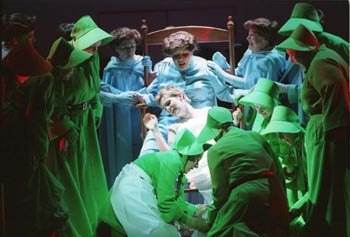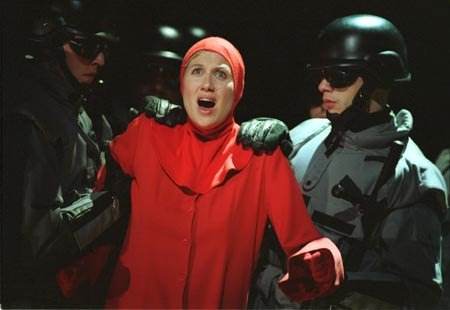S & H Opera Review
Poul Ruders, The Handmaidís Tale (UK première), ENO, 3rd April 2003 (MB)
Although this was principally the UK première of Poul Ruderís opera of Margaret Atwoodís dystopic fable it was also the world première of the English language version. And this was the travesty. Rarely can an opera sung in English have needed surtitles as this one surely did. Huge chunks of the libretto (thoughtfully provided by ENO, but quite useless in a blacked out opera house) were unintelligible, and what was audible was often opaquely sung and flatly delivered. It was, in fact, rather like watching a foreign language film but without the benefit of understanding what was being spoken. Not that the singers were always at fault; Ruderís writing for the voice is uniformly dull, largely monotonic and missing any dramatic contextualisation; a sharp contrast to his score which bristles with undercurrents of latent energy.
There may just be a reason for all this. With words often swamped by the choral settings (and a largely female chorus lying supine in a permanent state of childbirth), or projected through a megaphone (which Aunt Lydia uses before the execution), the vocal heart of this opera is often ripped out in some sort of post-surgical anaesthesia which numbs the words into a permanent state of paralysis. Only the amplified voice of the younger Offred made any aural sense and that is because we can actually hear it. The lack of any substantive narrative, and the remote use of drama and action, seem only to suggest that the religious fundamentalism that sits at the centre of the universe of the handmaidís tale eats into everything like a virus until what is left is a prism of despair and emptiness where even voices are the subject of a barren religious zeal, denied even the right to a unique individuality of timbre. For this reason alone it is almost impossible to write a review of this opera from the perspective of the singing. Deliberate or otherwise it is disconcerting for a reviewer.
As Peter Woolf has pointed out in his review of this production for Musical Pointers this is largely a cinematic production. It opens with footage of catastrophe and revolution (and scenes of the White House being blown up Independence Day style) and throughout we are subjected to images, projected on the back wall, of women being sexually abused, degraded or humiliated (when not projected as film, we witness multiple rape on stage). Breasts fondled, fingers jammed into vaginas, or the lingering last image of a naked woman bound with rope serve only to over-emphasise the literalism of the directorís view that this is an opera about women denied rights. Itís overtly pornographic, albeit in a top-shelf kind of way, and may well have been the root cause for so many people deserting the opera after the long first act. Whatever, the focal point is more feminist than it is religious (not one piece of iconography to be viewed anywhere just adds to this impression).
Birthing scene (Mary Nelson as Janine/Ofwarren)Phylida Lloydís obsession with film and literary imagery over gilds the lily at times. The monkish costumes of the handmaids and aunts (red and green respectively) are reminiscent of David Cronenberg (The Brood comes to mind), the eye burnt into the back wall recalls Nineteen Eighty Four and Brave New World and the scenes which take place before the revolution suggest any number of apocalyptic films, so widespread is the sense of panic that the world is about to end. The bookshelves, while full, are of books with the same white cover (has book burning, Ms Lloyd perhaps referring obliquely to Farenheit 451, another dystopian-cum-utopian work of fiction, already been done, I ask?)
With revolution comes brutality and there is no shortage of that in this production (especially of the sexual kind). Perhaps the only allusion that has any validity to the supposed Iranian fundamentalism, which partly inspired the novel, is of the corpses hanging from the rafters. More suggestive of brute medievalism than any liberalism evoked by the revolution in our fantasy Republic of Gilead, the hangings are at first just a symbol of oppression. In Act II, however, and in the only instance of real drama in this entire production, Ofcharles (guilty of adultery) and the Wife of Peter (guilty of murder) are hanged in full view of the audience. It is shocking because these arenít dummies, but real people with nooses hanging around their necks left to hang from the rafters. Moments afterwards a Guardian is dragged on stage to be beaten and kicked and then torn apart. ĎThe penalty for rape is deathí, he is told.
It is here that Ruderís music, quoting Bachís ĎPassioní chorale, reaches its sonorous, calamitous conclusion. But it is too late to redeem the connectivity between music and drama which has been conspicuously lacking throughout. After such promise eventually fulfilled, the quartet of Offred, Serena Joy, The Commander and Rita returns us to the familiar territory of musical separatism. The end of the opera, bringing us back to the narrator and the tape we have had played out before us, sums up in a nutshell what is missing in this production: its lack of impact. As an ending to an opera it is staggeringly inept, by some margin the weakest ending to any opera I know. And rather, as the libretto states, Ďa short burst of static then blackoutí we had Ďstatic and house lights come oní. Operatic suicide.
Stephanie Marshall as OffredThe cast make much what they can of the material before them. Stephanie Marshall is fine in the lead role as the handmaid Offred, Heather Sharp equally fine as her younger self from time before. Catherine Wyn-Rogers, as the Commanderís wife, and Stephen Richardson as The Commander, are sadly saddled with vocal writing which does little to persuade them to use their considerable voices to anywhere near their full potential. Helen Fieldís Aunt Lydia is a vision of power-crazed feminism gone too far, and she sounds just like that: crazed. Elgar Howarth conducts a sometimes febrile reading of the score bringing out Ruderís heavy bass lines with some power and he is supported by very well defined playing, notably from the very busy percussion section.
But, if one image sums up this production it is of Offredís daughter being carried away by the guards. Acted in slow motion it is as if she is wading through water so deliberate is her movement, or lack of it. This hugely disappointing production left me with the feeling that I was indeed wading through mire.
Marc Bridle
Photographer Credit: Neil Libbert
English National Opera / British premiere of Poul Ruders's opera 'The
Handmaid's Tale'.
Opera based on the novel of the same name by Margaret Atwood.
Production originally created by the Royal Danish Opera.
New Production supported by Vernon and Hazel Ellis.
ENO 1st Performance on Thursday 3 April 2003 at the London Coliseum.


 Return to:
Return to: